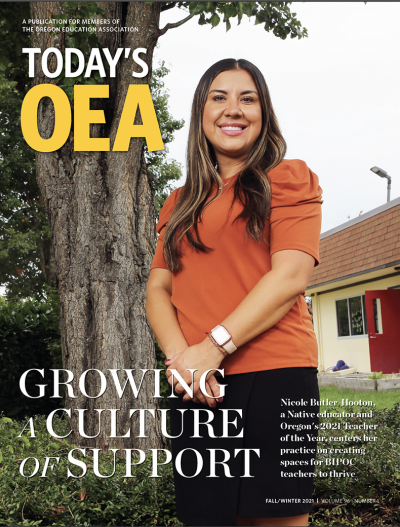Like so many other facets of public education, the COVID-19 pandemic has shined a spotlight onto our national obsession with summative assessments and all of the ways our current system of high stakes standardized testing fails to meet the needs of our students. For years, OEA has worked to lessen the “all-or-nothing” mentality that has so long been associated with student testing in our state – but that work took on additional importance this year when students returning to their classrooms for in-person instruction were looking at losing several days of precious contact time in order to meet testing requirements.

To try and avert this loss of learning time, OEA offered its support to the Oregon Department of Education (ODE) as they sought a full waiver from federal testing requirements through the US Department of Education. When that waiver request was ultimately rejected, OEA again offered our support to ODE as they applied for and secured an amended partial waiver that allows Oregon to scale back the number and length of exams that students would have to take for state’s summative assessment program this year.
Speaking about state testing waiver in a recent op-ed in the Oregonian, OEA President John Larson said, “While we support ODE’s efforts to give our school districts as much flexibility as possible when it comes to federal and state testing requirements this year, we firmly believe that any amount of time spent on standardized testing this year is time wasted. In the few weeks that our students and educators will have together before the summer we should instead be giving our educators the flexibility to determine and meet the unique needs of each of their students.”
Currently, families in Oregon have the right to “opt-out” their students from standardized testing — a legal right that OEA continues to fight to protect in our state legislature. And while the number of families who utilize this option has continued to grow every year, there are many families who may not know about their rights or may not have the time or energy to complete the necessary paperwork to opt their children out of testing.
“Let’s finish this most challenging of school years by expanding in-person instruction for our students while providing them with an education that meets their social and emotional needs, not by sticking them back in front of a computer screen so they can complete a meaningless standardized test.”
— John Larson, OEA President
In an effort to reduce the number of students taking state tests this year, OEA began working with districts throughout the state and encouraging them to change the current option for participating in assessments from an “opt-out” model to an “opt-in” model.
“Let’s finish this most challenging of school years by expanding in-person instruction for our students while providing them with an education that meets their social and emotional needs, not by sticking them back in front of a computer screen so they can complete a meaningless standardized test,” said Larson.
By switching to an “opt-in” model, rather than an “opt-out” model, every student is instead proactively opted out of testing unless their parents make the request to have their students complete the summative assessment. As of the writing of this story several districts, including Portland Public, Hood River, Ashland, Salem Keizer and more have either followed our recommendation to adopt an “opt-in” model for their testing — or they’ve cancelled their testing for this year altogether.
Beyond the pandemic, your union is committed to continuing this work. We know that the current model of high stakes standardized testing doesn’t actually give us a clear picture of student success or of student need, and we will continue to push for changes both locally and statewide that will give educators the flexibility they need to meet the unique needs of the students in their classrooms. We have an opportunity to create public schools that are better than the “normal” we had before the pandemic, and that includes a radical re-envisioning of what summative assessments look like in Oregon.

